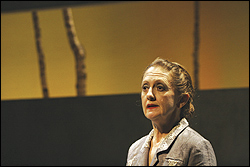You should go into Frozen (at the Empty Space through Sunday, Oct. 23; 206-547-7500) knowing that playwright Bryony Lavery’s final thoughts are disappointingly banal after first appearing to offer a more complex summation of unfathomable human grief. Lavery wastes a lot of unnecessary metaphor trying to justify her play’s title—i.e., Dr. Agnetha Gottmundsdottir (Kate Wisniewski) is an American psychiatrist of Icelandic heritage studying “the Arctic frozen sea that is the criminal brain”—but when she stops such nonsense, she does empathetic work showing us the process of three characters moving into and out of the ice surrounding their emotions. Frozen, performed as well as it is in director Chay Yew’s harrowing production, says enough about people struggling to grant themselves the often frightening freedom to feel that Lavery’s less subtle flourishes and lax denouement are best brushed away.
Wisniewski’s Agnetha has come to England to plumb the depths of the deviant brain of Ralph Wantage (Peter Crook), a serial child killer whose many victims included the 10-year-old daughter of Nancy Shirley (Lori Larsen). Agnetha hides some hurt of her own but . . . well, more on that later. The play turns on a series of monologue confessionals that then shift into two-person encounters. We hear Agnetha, still shaken by whatever is haunting her, deliver a strained address on frontal-lobe dysfunction; Ralph, like Gollum with his ring, hordes his kiddie porn collection with infantile triumph; Nancy wavers from hope to a hardened sadness and, just maybe, back again.
Such a structure plays perfectly into Yew’s strength for emotive stage pictures, for viscerally connecting the loaded space between performers. When Crook exits by cooing a lascivious “hello” at his next target while Larsen enters to elucidate the anguish he’s caused, the ironic bond Yew establishes gets the hair on the back of your neck prickling.
That uncomfortable tingling grows when you realize that you will, eventually, have to watch Ralph and Nancy meet. Under Yew’s unadorned guidance, Crook and Larsen have so openly insinuated themselves into the roles that the thought of witnessing the clash of their singular sorrows is both a thrill and a painful burden. Crook’s Ralph is a damaged, sniveling, overgrown boy who can’t allow himself to recognize the monster he’s become even as he tries to compose an apology to Nancy; his pitiful tics—slurping, squinting, and the hair-trigger wincing of a person who’s been slugged once too often—would fall into caricature in lesser hands. Larsen, in the best performance of her estimable local career, portrays the full cycle of an ordinary woman’s escape from devastation without a hint of reaching for effects. An occasional measured pause or the desperate flutter of a hand is all her Nancy has to let us know she’s screaming inside. She’s everybody’s mother here, forced daily to make new sense of the senseless. Her quiet confrontation with Crook is heartbreaking (“Can you see it hurt Rhona, then?” she asks); her strange, subdued joy upon viewing Rhona’s remains is even more so.
It’s a bit of a bum deal for Wisniewski, then, that she’s stuck with Agnetha. How to inhabit someone that Lavery herself hasn’t made a whole person? Wisniewski is a solid presence, and her eyes occasionally well up and suggest someone whose adamant professionalism can’t completely give way to remorse. But when we’re at last given the revelation we’ve been waiting for, it’s so hackneyed that even Wisniewski seems embarrassed by it. (She actually has to turn to Larsen’s full-blooded human and utter a dead-on-delivery cliché like, “Why am I telling you this?”) Agnetha’s secret—some bit about a beloved colleague—is a trifle, which, Lavery might want us to believe, is the whole point: We needn’t fixate on tragedies when there is so much more to bear, when there is so much life to live. Well, sure, but is that really all we get after watching a mother hold her daughter’s skull?
Frozen seems to push us away just when we’ve given ourselves over to an exploration of our darkest concerns. To leave us with, “Live with it”—one of the play’s final lines—is a shoddy betrayal of our investment and almost deadens the delicate humanity that Lavery, Yew, and two remarkable performances have otherwise kept so indelibly alive.








